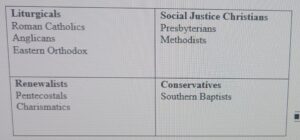When we say, “What did I do to deserve this?”, we are usually referring to something bad that we have experienced. I have had a number of those experiences myself. I have had cancers three times, losing my left eye to the first of these. I have developed atrial fibrillation and hypertension, requiring half a dozen prescription medications and several surgeries, including the implantation of a pacemaker to control these conditions. I have been out of work several times for periods of six months to a year (actually self-employment with zero income for that year). And my wife Mary died nearly six years ago leaving me a widower. I suppose I could ask, “What did I do to deserve all this?”
However, I also have a great deal to be thankful for. I am now cancer-free, I have learned to live with monocular vision for more than 30 years, and I am still reasonably fit and active. I can still drive my own car and I can walk and run (though not often) without any assistance. And when I look back over the 81 years (so far) of my life, I have much more to be thankful for. I was happily married to a charming, lovely, highly intelligent, loving and caring woman for nearly 53 years, and we shared an exciting and rewarding life of challenge, adventure and accomplishment all of those years. We had opportunities to enjoy professional careers in several different industries, including aerospace manufacturing, commercial/industrial building construction, commercial real estate, telecommunications, and university academia, as well as stints as independent consultants in marketing and career transition.
During our years together, Mary and I were able to indulge in our joint passion for travel, seeing new sights, and experiencing new cultures (and foods) in all 50 of the United States and more than 60 foreign countries around the world. We lived in a number of cities in Texas, as well as spending 9 years in Baton Rouge, Louisiana and 2 years in Virginia Beach, Virginia, meeting and becoming friends with many people in each place. We also had opportunities to associate with people in several different Christian denominations, including Roman Catholicism, United Methodist and Charismatic Methodist churches, a Southern Baptist church, an Assemblies of God church, a Charismatic Presbyterian church, and since 1985, a PC(USA) Presbyterian church, discovering in the process that they all had the same basic Christian beliefs, although differing in more peripheral issues. In other words, they were all part of the same universal family, even though they often quarreled over different perspectives on what they considered matters of importance.
I have a delightful daughter, a wonderful son-in law and two terrific grandsons that I stay in close contact with. Since my official retirement in 2010, I have been able to offer my services on a pro bono basis to counsel people in job transition on how to find the best possible employment opportunities to do meaningful work that utilizes their talents, abilities, experience, passions, and personality, while maintaining a healthy work-life balance. A very rewarding experience for me. And I am still able to indulge in my passion for constructing and flying radio control model airplanes.
So, all in all, I have a great deal to be thankful for, and the truth is, when I ask, “What did I do to deserve this?”, the answer is emphatically “Nothing!”. I have been the recipient of God’s grace all the days of my life, in spite of my many failings and misadventures. And since grace is defined as unmerited (or undeserved) favor), I have done nothing to deserve it.
Realizing that is why when people ask me how I am doing, I now answer, “I am doing remarkably well, much better than I deserve.”
